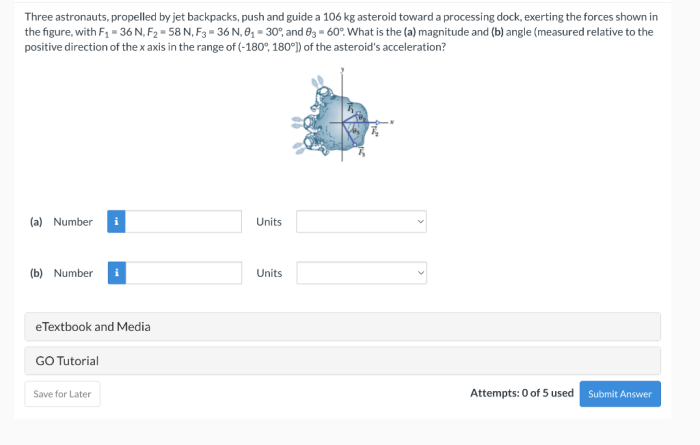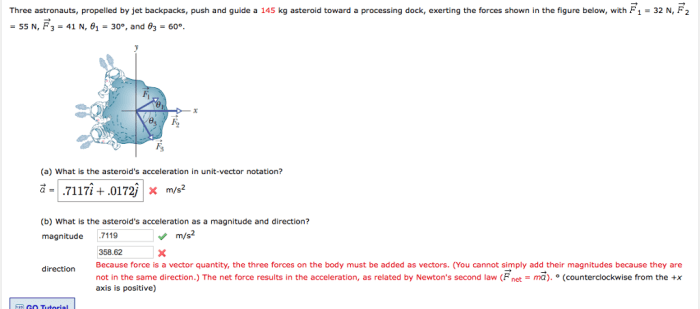With three astronauts propelled by jet backpacks taking center stage, this exploration unveils a captivating narrative that delves into the realm of space exploration. This technological marvel opens up a new chapter in human spaceflight, promising unparalleled maneuverability and unprecedented possibilities.
Jet backpacks, meticulously engineered to navigate the unforgiving vacuum of space, empower astronauts with unprecedented control and agility. This transformative technology not only enhances their ability to conduct spacewalks and satellite servicing but also paves the way for daring missions to distant celestial bodies.
Astronaut Propulsion Systems
Astronauts rely on various propulsion systems to navigate and perform tasks in space. These systems include:
-
-*Rocket propulsion
Uses the principle of action-reaction to generate thrust by expelling propellant at high speeds.
-*Gas-propulsion
Employs compressed gas to power maneuvering units, providing precise control and stability.
-*Electric propulsion
Utilizes electrical energy to accelerate ions or plasma, offering high efficiency and extended operation time.
Jet Backpacks for Astronauts

Jet backpacks, also known as Manned Maneuvering Units (MMUs), are wearable propulsion devices designed for astronauts. They consist of:
-
-*Nitrogen gas thrusters
Provide thrust for maneuvering and translation in space.
-*Control system
Regulates the direction and intensity of thrust.
-*Life support system
Maintains the astronaut’s breathing and environmental conditions.
Astronaut Training and Simulations

Astronauts undergo rigorous training to operate jet backpacks safely and effectively. This includes:
-
-*Ground-based simulations
Using mock-ups and virtual reality to practice maneuvering techniques.
-*Parabolic flights
Creating brief periods of microgravity to simulate space conditions.
-*Actual spacewalks
Gradual exposure to the challenges of spacewalking and jet backpack use.
Applications of Jet Backpacks in Space
Jet backpacks have been used in numerous space missions, including:
-
-*Satellite servicing
Repairing and maintaining satellites in orbit.
-*Space station assembly
Assisting in the construction and maintenance of space stations.
-*Exploration missions
Providing mobility and support for astronauts exploring the lunar surface or other celestial bodies.
Design Considerations for Jet Backpacks
Designing jet backpacks involves balancing factors such as:
-
-*Weight
Minimizing weight to reduce astronaut fatigue and increase maneuverability.
-*Power
Optimizing the power source to provide sufficient thrust while maintaining efficiency.
-*Maneuverability
Ensuring the backpack allows for precise and agile movements in all directions.
Safety and Reliability of Jet Backpacks
Ensuring the safety and reliability of jet backpacks is paramount:
-
-*Redundant systems
Implementing backup systems to prevent catastrophic failures.
-*Extensive testing
Conducting thorough testing to verify the backpack’s performance and durability.
-*Emergency procedures
Establishing clear protocols for handling malfunctions and emergencies.
Future Developments in Jet Backpack Technology: Three Astronauts Propelled By Jet Backpack

Advancements in jet backpack technology are ongoing:
-
-*Improved propulsion systems
Developing more efficient and powerful propulsion systems for enhanced mobility and range.
-*Advanced control systems
Incorporating advanced control algorithms for greater precision and stability.
-*Integrated sensors and cameras
Enhancing situational awareness and enabling remote operation.
Questions Often Asked
What are the advantages of using jet backpacks in space?
Jet backpacks provide astronauts with increased mobility, allowing them to maneuver freely in space and perform complex tasks with greater precision and efficiency.
How do jet backpacks work?
Jet backpacks utilize thrusters powered by compressed gas or propellants to generate thrust, enabling astronauts to control their movement and orientation in space.
What are the challenges associated with using jet backpacks in space?
Operating jet backpacks in space requires specialized training and careful consideration of factors such as fuel consumption, maneuverability, and potential risks.